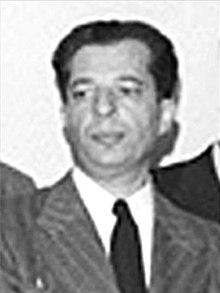Albert Maltz
| Albert Maltz | |
|---|---|

Albert Maltz (1947)
|
|
| Born |
October 28, 1908 Brooklyn, New York |
| Died | April 26, 1985 (aged 76) Los Angeles, California |
| Occupation | Fiction writer and screenwriter |
Albert Maltz (October 28, 1908 – April 26, 1985) was an American playwright, fiction writer and screenwriter. He was one of the Hollywood Ten who were jailed in 1950 for their 1947 refusal to testify before the US Congress about their involvement with the US Communist Party. They and many other US entertainment industry figures were subsequently blacklisted, which denied Maltz employment in the industry for many years.
Born into an affluent Jewish family, in Brooklyn, New York, Maltz was educated at Columbia University and the Yale School of Drama. He became a communist out of conviction, later telling an interviewer: "I also read the Marxist classics. I still think it to be the noblest set of ideals ever penned by man.... Where else in political literature do you find thinkers saying that we were going to end all forms of human exploitation? Wage exploitation, exploitation of women by men, the exploitation of people of colour by white peoples, the exploitation of colonial countries by imperialist countries. And Marx spoke of the fact that socialism will be the kingdom of freedom, where man realizes himself in a way that humankind has never seen before. This was an inspiring body of literature to read."
During the 1930s, Maltz worked as a playwright for the Theater Union, which was "an organization of theater artists and [pro-Communist] political activists who mounted professional productions of plays oriented towards working people and their middle-class allies." In 1932, his play Merry Go Round was adapted for a film. At the Theater Union he met Margaret Larkin (1899–1967), whom he married in 1937. He won the 1938 O. Henry Award for "The Happiest Man on Earth", a short story published in Harper's Magazine, and a collection of short fiction The Way Things Are, and Other Stories was published the same year. These writings and his 1940 novel The Underground Stream are considered works of proletarian literature.
...
Wikipedia
